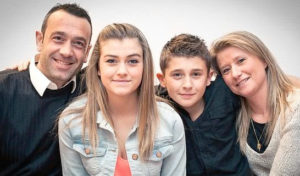Part of building up the physical immune system is the ability to live in the real world fully, being exposed to certain risks (like germs or viruses) and allowing the body to adapt to protect itself – but without having to live like the “boy in the bubble.”

There are millions of posts on how to fight disease and strengthen our physical immunes systems on the Internet. A Harvard Health Publishing article, updated in October 2017, reports that “On the whole, your immune system does a remarkable job of defending you against disease-causing microorganisms. But sometimes it fails: A germ invades successfully and makes you sick. Is it possible to intervene in this process and boost your immune system? What if you improve your diet? Take certain vitamins or herbal preparations? Make other lifestyle changes in the hope of producing a near-perfect immune response?”
How can this apply to our building the emotional immune systems of our children and young people?
In a world that can be stressful, with terrorist incidents, bullying, and the inevitability of sad events in all our lives, building up an ability to absorb and even embrace the sadness and confusion life brings with it is what we like to call a very positive emotional immunity.
Boosting our physical immunity is so attractive that it has created multi-billion dollar businesses for herbal supplements and more, and still immune system perfection has proved elusive.
Why?
Because both physical – and emotional – immune systems are systems – with many dependencies and a need to develop harmony given multiple factors.
“There is still much that researchers don’t know about the intricacies and interconnectedness of the immune response. For now, there are no scientifically proven direct links between lifestyle and enhanced immune function,” the Harvard Health Publishing article says, “But that doesn’t mean the effects of lifestyle on the immune system aren’t intriguing and shouldn’t be studied. Researchers are exploring the effects of diet, exercise, age, psychological stress, and other factors on the immune response, both in animals and in humans. In the meantime, general healthy-living strategies are a good way to start giving your immune system the upper hand.”
What are the healthy-living strategies parents and other grown ups who influence our children and young people can invoke to help build emotional strength?
Here are a few tips:
- Talk openly about feelings, including those we often wish to hide away: fear of disappointment, anger, resentment, frustration, rejection. Take respectability for those feelings.
- Avoid doing their chores (cleaning their rooms, getting them ready for school, reminding them of their medication, homework, school projects and so forth)
- Offer help only when you are asked to
- Avoid protecting them from the truth of life, even if it is difficult: for example, when an incident occurs in your town, for example an act of violence in a school, don’t be afraid to have a conversation about what this means.
- When your family is faced with a crisis – whether an illness, a death in the family, a financial crisis or other difficult situation, ask your child or teenager how they are experiencing the journey. Allow them to participate in the process. Be there for them when they need your time to work through what can often be painful, and at the same time moments of self-awareness and discovery.
- Practice a healthy lifestyle – eat well, exercise, go outside and move together as a family and as friends, get enough sleep, and otherwise enjoy the good things in life; the same activities that help strengthen our physical immune system also help children and young adults have the energy and focus to be able to process life’s more challenging events. Engage and empower them to experiment a healthy life style.
- Set the example – kids look up to their parents and close-in relatives and friends; when they witness thoughtful reactions to negative events, they are learning how to think and feel more deeply, to neither go into denial, nor respond with violent outbursts or other “wild swings” of behavior.
- Encourage them to develop a healthy “social network” or support system (family member, relatives, family friends, childhood friends)
- Teach them taste happiness by hard work and responsibility
- Celebrate their resilience after a fall.
Building emotional immunity is all about building internal strength, and this will serve children and young people throughout their lives.
The importance of emotional immunity, as is the case with physical immunity, becomes even more important as we age.
Appreciate the connection between emotions and physical health as there are important linkes between mind and body.
Many illnesses have been scientifically linked to emotional stress, including heat disease, one of the most prevalent causes of premature death. Scientists continue to study the relationship between stress and immune function.
To boost physical healing, we need to reduce the amount of stress, fear, and conflict and increase the amount of love and happiness in our lives. It helps to plan a purposeful day, performing altruistic acts, doing volunteer work, developing empathy and kindness towards others, especially the elderly. Love and happiness are instinctively felt when we give love and happiness to someone else.
And to boost emotional healing, we can learn to manage our stress and help our children manage their stress – not by pretending bad things don’t happen. They do. Rather, we manage stress by engaging in how we are feeling about our disappointments, our losses, and embracing “the perfectly imperfect” nature of life, from birth to death, in a world which is forever changing.